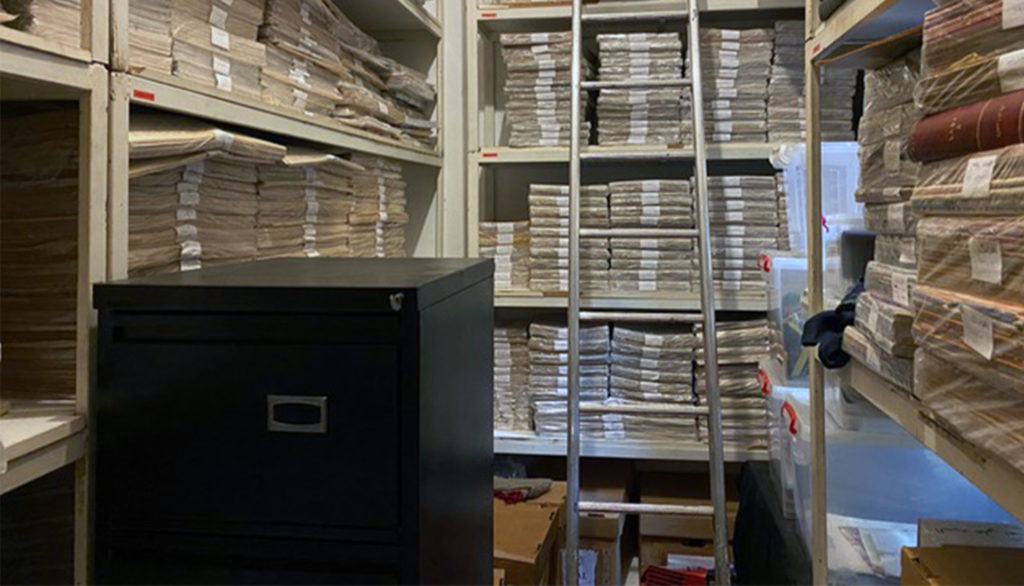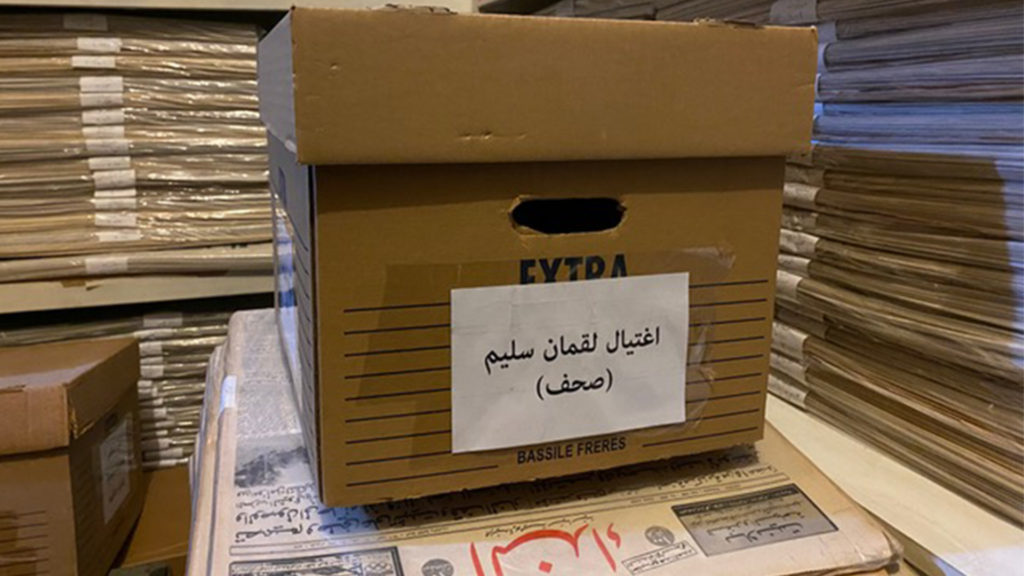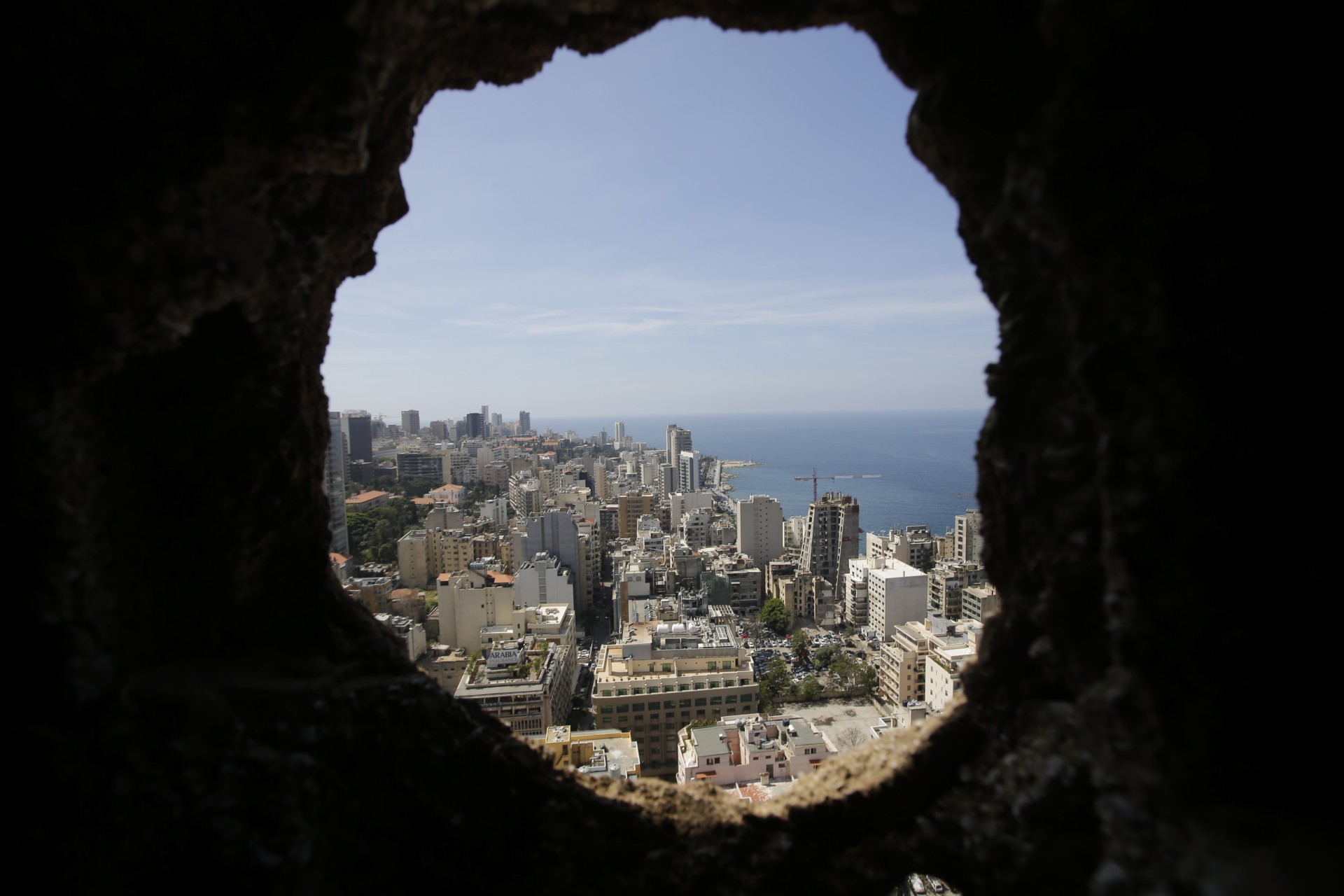In his small office south of Beirut, engulfed in hundreds of old books with a single fluorescent light bulb hanging over his head, Abbass Hadla sits behind his desk typing away at his computer. “The Lebanese civil war ended with the murderers victorious, and their victims defeated,” he said. “Instead, we got a general amnesty law that allowed them to enjoy their spoils.”
The warlords-turned-politicians passed that law in late August 1991. Under it, the victims of massacres found no justice, and one of the most devastating conflicts of modern Lebanon, which lasted from 1975 to 1990, was officially deemed a tiny hiccup in the country’s short, tumultuous history.
With no genuine reconciliation, almost every detail of the civil war is still up for debate, including its cause. Hadla has been tirelessly researching and archiving Lebanon’s recent history at UMAM Documentation and Research over the past 16 years, an endeavor with particular strengths in newspaper clippings and relics. He says this work is necessary because open and impartial conversations about the civil war are rare.
“Usually, the father wouldn’t go to his son and say, ‘Son, there was a civil war, and this is what happened,’ in a frank way. Depending on the sect, they would say that there was a war that threatened our rights as a sect — and now we regained our rights by destroying them.”
The civil war isn’t taught in Lebanese schools, and the most recent artifacts of Lebanon’s national museum date to over 500 years ago. Though architect Mona Hallak repurposed a war-torn building in Beirut’s Achrafieh district to become a museum of memory, it was the mayor of Paris who was far more committed and enthusiastic than the mayor of Beirut. It holds sporadic exhibitions but is not an official museum.
“The problem in Lebanon is that the narratives are purely based on oral history — there is an absence of any methodological reconciliation work related to the civil war,” historian Charles al-Hayek told New Lines. “Want to know what happened during the war? You go ask your crazy uncle who fought.”
Hadla continues to anxiously scroll through a dizzying collection of some 26,000 scanned clippings spanning over half a century from Lebanon’s mosaic of newspapers. From Annahar to Assafir, and a handful of newspapers that no longer exist, each moment in the country’s history is now accessible with its different spins and takes. Hadla says he does not want to promote a certain point of view but rather make all of them accessible for people to establish their own informed opinions.
It’s an arduous task. “The search is good but can be better,” he said. “But we’ve catalogued about 16,000 keywords so far.” There are even subcategories in the digital archive, including “Who Killed Who,” an index of assassinations in Lebanon since 1975. It includes political leaders, activists, and others across the spectrum, from right-wing President-elect Bachir Gemayel of the Kata’ib Party to communist writer Mahdi Amel. (On a more hopeful note, “Assalam Alaykum” catalogues the handful of conflict resolution and reconciliatory efforts throughout the troubled country’s recent history.)
In the room next door is a maze of stacks of thousands of newspapers spanning back decades, bundled in plastic with labels citing the year they were printed. There is also a ladder in the corner — necessary to access the sheer volume of papers they have collected.

But there are more than just old newspapers. UMAM has plastic containers labeled with Lebanon’s different political parties aligned in the corner of the dizzying room. There are invitation letters for events and medical reports of wounded militiamen belonging to the Amal Movement, party flags, and even a security shift schedule of the Kata’ib Party at one of their offices. “Every detail is a little bit of history,” Hadla said with a smile as he turned the pages of a binder he found with old letters and newspaper clippings. Where does he find all these things?
“Buildings and hotels that are about to be demolished — they still have things left behind,” he said. “You could find so many memoirs from old hotels.” Some people have donated these relics — some wanting to move on from their past or simply having no interest in it. But some relics were found in dumpsters, too. Whatever it is, Hadla will happily archive it. “If we find out there is any legal violation in sharing something, then we’ll wait before putting it out,” he admitted.
After passing by one of his colleagues piecing together a series of old real estate and municipality documents from the early 20th century, Hadla walked through a small library of old books that UMAM has collected: a 1959 edition of assassinated Druze leader Kamal Jumblatt’s “The Truth of the Lebanese Revolution,” an illustrated picture book by the Palestinian Liberation Organization about the siege of the Tel al-Zaatar refugee camp, and a booklet about Hezbollah leader Hassan Nasrallah titled “The Arab Legend.” There was even a worn-out binder that belonged to the Syrian Lebanese Higher Council — an entity formed in 1991 when Lebanon was under Syrian tutelage. Even though Damascus withdrew its troops in April 2005, the organization surprisingly still exists to this day.
But despite its impressive collection, UMAM has faced a tragic loss. Its co-founder, political commentator and publisher Lokman Slim, was assassinated on Feb. 4. He went missing the night prior and was found dead in his car, shot numerous times from close range.
In the spirit of his work, UMAM’s team added a new box to its massive archive collection, labeled “The Assassination of Lokman Slim.”

“Palestinian? Stand up! Stand up!” Those were the last words Imm Aziz heard before a Christian militia kidnapped four of her children — the youngest was 13. The militiamen threw them onto a truck loaded with many Palestinians and zoomed off while beating them. Her fifth son was fortunate that morning; he was not at their southern Beirut home. “I would have let the trucks run over me and kill me,” she said in an interview, had she known she would never see her sons again. It was in 1982, around the same time the Kata’ib-affiliated militias massacred Palestinians in the Sabra and Shatila refugee camps under Israeli guard.
Today, 90-year-old Imm Aziz is still waiting for a miracle: to know what happened to her sons. Almost 40 years ago, she hung framed portraits of her four sons on her living room wall, with prayer beads placed between them. Imm Aziz also kept their belongings: her 13-year-old son’s green and red school bag, shaving razors and brushes, loose change she found in the pockets of their pants, even a copy of the New Method English dictionary. She also hung on to cigarettes and car keys belonging to Aziz, her eldest son.
“Her home was basically a shrine,” photojournalist Dalia Khamissy said. Khamissy lived through the civil war herself but never thought she would dedicate years of her life to the families of about 17,000 people who were kidnapped or disappeared during the war.
Khamissy started learning about the missing in 2009 and met protesting families that sat outside the United Nations building in downtown Beirut. In April 2005, families of those disappeared at the hands of the Syrian security agencies when Lebanon was under Damascus’ control pitched a tent, demanding their right to know their loved ones’ whereabouts. Soon, it became a space for families of those disappeared during the civil war.
“I would visit the families on Thursdays and join them for coffee or even lunch. I spent a lot of time with them,” Khamissy recalled. “There were also NGOs and activists.” Among them were Wadad Halwani and Ghazi Aad, two renowned activists who dedicated decades of their lives to the disappeared. Aad passed away in 2016.
The Committee of the Families of Kidnapped and Disappeared in Lebanon has been campaigning since 1982. Wadad Halwani, along with other women whose family members and loved ones went missing, established the organization, though their efforts thus far are in vain.
The Lebanese government unsurprisingly continues to drag its feet when it comes to the missing. It first established a commission of security officials in 2000 that, within a few months, concluded that none of the missing or disappeared should be considered alive and that many are in mass graves across Lebanon. Then another committee was formed in early 2001, consisting primarily of security officials. It said they would investigate the matter for another six months and claimed it would go as far as questioning militia leaders and Syrian security officials. It came to nothing.
Over time, many of the families welcomed Khamissy into their homes. The photojournalist interviewed them and shared their heartbreaking stories. Most of them were mothers. “Every story is extremely sad,” she said, still in disbelief. “The feeling of someone losing their child is something I cannot comprehend.”
One of the first stories that immediately came to Khamissy’s mind was that of Maguy Andreotti, who is currently living just east of Beirut in Sad el-Bouchrieh. Two of Andreotti’s children tragically died in the civil war: her 9-year-old was killed during intense shelling, while her youngest, who was a year old and just learning to talk, died in her arms after suffocating from the smoke. Her husband later died as well. However, Andreotti still thinks of her third and eldest son, Stavro, who was kidnapped in 1978.
“She only ever talks about Stavro,” Khamissy said. “Because she still hopes he is around.”
Khamissy’s work has amplified this unresolved battle of Lebanon’s civil war; she has co-produced segments for the BBC, and the International Committee of the Red Cross has featured her work.
But mothers who have been waiting painfully for decades have passed away without knowing the fates of their loved ones. On March 2, Om Hassib, who lost her three sons, passed away after waiting for almost 40 years with no answers. Then on April 9, Amina Atwat, who also waited for decades to know the fate of her three children, suffered the same fate.
The Lebanese government passed the landmark Law 105 in 2018, which announced an independent national commission to discover the whereabouts and fate of the missing. The commission would also investigate missing Palestinians, Syrians, and other non-Lebanese nationals. The government didn’t officially appoint its members until July 2020, just weeks before the explosion at the Port of Beirut that flattened much of the country’s capital.
Khamissy is now meeting and interviewing families of those who died in the Beirut port explosion, an event she fears could result in a general amnesty of its own.
Acquaintances and friends still pester Khamissy for her depressing — albeit crucial — work. “They ask me, ‘Why are you still living in the civil war? Move on. Everyone murdered people,’” she scoffed. “Alright, if everyone murdered people, then let them get tried for their crimes.” But will that ever happen?
The work of Khamissy, Hadla, and others fills a huge gap and is crucial for any form of genuine reconciliation and sustainable state-building in Lebanon, a fragmented country constantly on the brink. However, the country’s ruling class — its warlords and businessmen-turned-politicians and their cronies — aren’t too pleased.
“This is neglect that serves the ruling class because sometimes when you study history and uncover its events, you start to question things,” al-Hayek said. “The current situation helps in maintaining the lines of division during the war — and sometimes it’s even romanticized.”
And would Lebanon’s rulers compromise themselves through a thorough and forceful investigation into the fate of the missing? “The warlords are our MPs, ministers, and party leaders — if you want to uncover a mass grave, you will shake the system,” the historian said.
Lebanon’s rulers insist on letting bygones be bygones when it comes to the civil war, but they also will occasionally scare their people about another one, should they choose to mobilize against them — as they did in late October 2019. Talking about the civil war critically has become frowned upon, though al-Hayek says there should be “no taboos in history.”
And this state-sponsored amnesia appears to be their policy for the foreseeable future.
“When we started bringing up these topics (about the war), people accused us of digging up graves, threatening the civil peace, trying to divide the Lebanese — just about anything you could think of,” Hadla said with a smirk as he scrolled through newspaper clippings in UMAM’s digital archive.
“Before there can be any reconciliation, there needs to be forgiveness, but there first needs to be the truth.”



